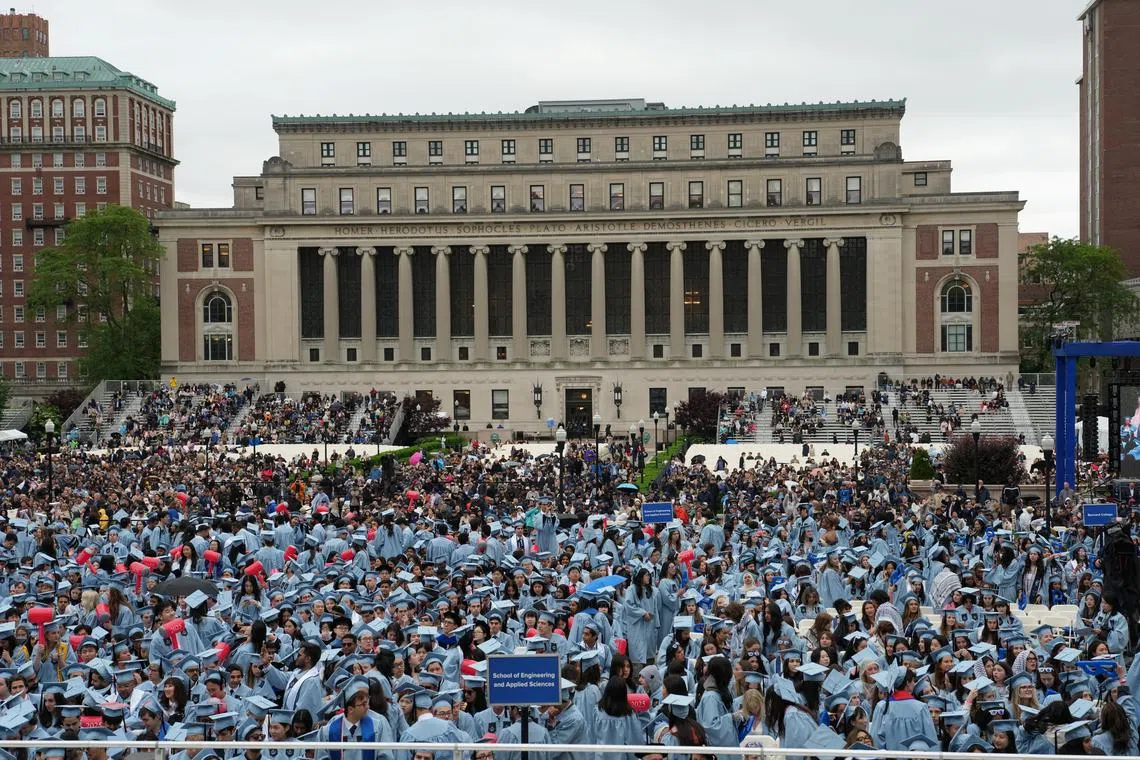Columbia and Trump near a deal, with school possibly paying millions
Sign up now: Get ST's newsletters delivered to your inbox

Columbia’s decision to negotiate with the Trump administration rather than sue was widely criticised within academia as a form of capitulation.
PHOTO: REUTERS
Sharon Otterman and Michael C. Bender
Follow topic:
NEW YORK – Columbia University and the Trump administration on July 11 were nearing a deal in the contentious fight over allegations that the school had failed to protect Jewish students from harassment, with Columbia potentially agreeing to pay hundreds of millions of dollars to settle the matter, according to two people familiar with the discussions.
The deal, which remains in draft form, would restore at least some of the US$400 million (S$512 million) in federal research funding
The existence of a potential deal was confirmed by a third person, who, like the others, spoke on the condition of anonymity to describe sensitive negotiations.
The deal could include US$200 million or more in compensation paid by Columbia for alleged civil rights violations. Columbia officials are expected to meet with Trump aides next week at the White House to finalise the deal, said one of the people familiar with the discussions.
A university spokesperson on July 11 night did not confirm details of the deal or the potential White House meeting. “The university is focused on advancing the discussions with the federal government. There is no resolution at this time,” the spokesperson, Ms Virginia Lam Abrams, said.
The current draft of the deal, which was first reported by The Wall Street Journal and The Free Beacon, does not go as far in exerting federal authority over the university as an earlier version that was circulated in April.
That deal would have included a judge-approved consent decree, which is a kind of legally binding performance-improvement plan, according to a copy of that agreement obtained by The New York Times.
A consent decree, which would have given the Trump administration significant control over the university for years to come, is not part of the current discussions, the people said.
In March, after the US$400 million in funding was cut, Columbia agreed to an initial set of demands
Columbia’s decision to negotiate with the Trump administration rather than sue was widely criticised within academia as a form of capitulation. Harvard University took a different approach, choosing to sue.
Ms Claire Shipman, Columbia’s acting president, has defended her strategy, writing in a letter to the university community in June: “Following the law and attempting to resolve a complaint is not capitulation.”
And Harvard, despite its litigation, has also restarted talks with the Trump administration regarding the return of billions of dollars in federal research funding that have been cut.
While the exact terms of Columbia’s agreement are still being negotiated, it could be the first university to come to a resolution with the Trump administration for the return of research funding pulled as a result of antisemitism concerns.
The Trump administration announced March 7 that it was cancelling millions of dollars in grants and contracts to Columbia, an extraordinary step that made the university the first to be punished by the administration for what it called unacceptable harassment of Jewish students on campus after the start of the Israel-Hamas war. Punishment for other universities, including Harvard, Cornell and Northwestern, soon followed.
As weeks passed, it became evident that the damage to Columbia’s research enterprise went further than the original cut. The National Institutes of Health, the government’s premier medical research funder, froze nearly all research funding flowing to Columbia, including for reimbursement of grants that were still active.
Grant Watch, a project run by research scientists who compiled information on the grants pulled by the Trump administration, estimated this week that about US$1.18 billion in unspent funding to Columbia from the NIH had been terminated or frozen. Other federal agencies, including the National Science Foundation, also pulled grants.
Columbia was reaching a “tipping point” of preserving its research excellence, Ms Shipman said in June. Columbia’s board met on July 6 to discuss potential terms of a deal, one of the people familiar with the matter said.
The negotiations with Columbia have been directed out of the White House by a team led by a Trump adviser, Mr Stephen Miller, with additional involvement of an interagency task force on antisemitism. NYTIMES

